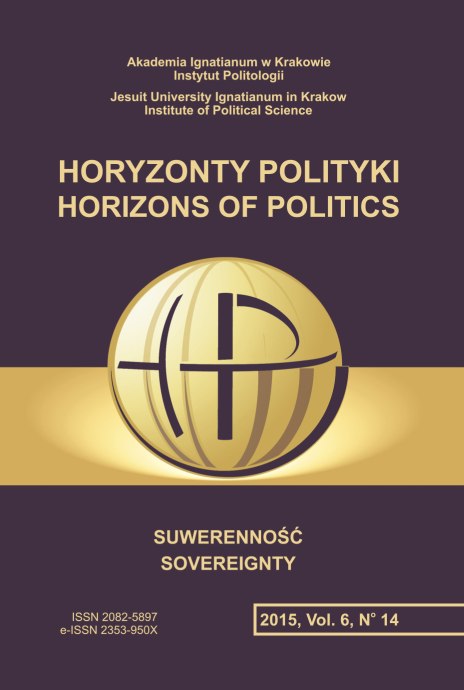Gdzie uplasować suwerenność w ustrojach federalnych? Wprowadzenie do analizy ustrojów Argentyny, Stanów Zjednoczonych Ameryki oraz Szwajcarii
Where can sovereignty be located in federal political systems? An introduction to the analysis of the regimes of Argentina, the United States of America, and Switzerland
Author(s): Sergiusz BoberSubject(s): Politics / Political Sciences, Politics, Political Theory, Governance
Published by: Uniwersytet Ignatianum w Krakowie
Keywords: Argentina;federalism;USA;sovereignty;Switzerland
Summary/Abstract: Celem badawczym artykułu jest udzielenie odpowiedzi na pytanie, gdzie uplasować suwerenność w ustrojach federalnych Argentyny, Stanów Zjednoczonych i Szwajcarii? Zarazem jest to pytanie o to, kto (jaki podmiot) jest nośnikiem suwerenności (a więc suwerenem) w analizowanych ustrojach. W artykule posłużono się następującą metodą. Najpierw analizie poddane zostały dwie główne kategorie – suwerenność oraz ustrój federalny. W odniesieniu do pierwszej z nich, obok ujęć teoretycznych, przedyskutowane zostały także jej definicje filologiczne, celem możliwie najbardziej precyzyjnego ustalenia jej znaczenia. Analiza drugiej spośród kluczowych kategorii, poza ustaleniem jej zakresu znaczeniowego, miała także na celu wskazanie wpływu kategorii suwerenność na konceptualizacje kategorii ustrój federalny. W ostatniej części tekstu kategorie suwerenność i ustrój federalny wykorzystane zostały do zwięzłej analizy trzech wspomnianych ustrojów federalnych, celem udzielenia odpowiedzi na zasadnicze pytanie badawcze. Skutkiem przeprowadzonej analizy jest teza stwierdzająca, że suwerenność nie może być dzielona w ramach tego samego systemu federalnego na kilka podmiotów. Ustalenie to prowadzi jednocześnie do zakwestionowania poprawności stosunkowo częstych definicji ustroju federalnego, opartych o założenie dopuszczające dzielenie suwerenności. Dalsze badania powinny polegać na poszerzeniu porównawczej analizy o kolejne ustroje federalne, celem wykazania, czy poczynione ustalenia mogą być uogólnione. Bazę źródłową dla niniejszych rozważań stanowiły w przeważającej mierze źródła drukowane, w postaci aktów prawnych (przede wszystkim konstytucji) oraz opracowań dotyczących suwerenności, ustroju federalnego w ogóle oraz jego trzech wymienionych wariantów. Wykorzystano także pewną ilość źródeł internetowych (głównie słowniki).The research objective of the present study is to answer the following question: where can sovereignty be placed in the federal systems of Argentina, the United States of America and the Swiss Confederation? It is also a question relating to the sovereign: which subject, in the indicated federal systems, can be described in this way. To achieve the aforementioned aim, the following method has been used. First, the two main categories are analyzed, i.e. sovereignty and a federal system. With regard to the first of them, to achieve the most precise understanding of it, not only the theoretical interpretations of the concept of sovereignty are discussed, but also its various philological definitions. The analysis of the second of the main categories, besides leading towards its definition, has also revealed, how various conceptualizations of the federal system are influenced by the concept of sovereignty. In the final part of the article these categories are applied in a concise analysis of the three mentioned federal systems, in order to answer the central research question. As a result, the following conclusion can be drawn: sovereignty cannot be divided among various subjects in a single federal polity. Subsequently, frequent conceptualizations of the federal system based upon the notion of divided sovereignty must be perceived as incorrect. Additional research shall broaden the scope of the comparative analysis to include other federal systems, in order to establish if the present conclusions could be generalized. The undertaken research is based primarily on printed sources i.e. legal acts (especially the constitutions) and secondary sources concerning sovereignty, federal system in general and its three studied variants. A certain number of internet sources was also used (mostly the dictionaries).
Journal: Horyzonty Polityki
- Issue Year: 6/2015
- Issue No: 14
- Page Range: 161-194
- Page Count: 34
- Language: Polish

